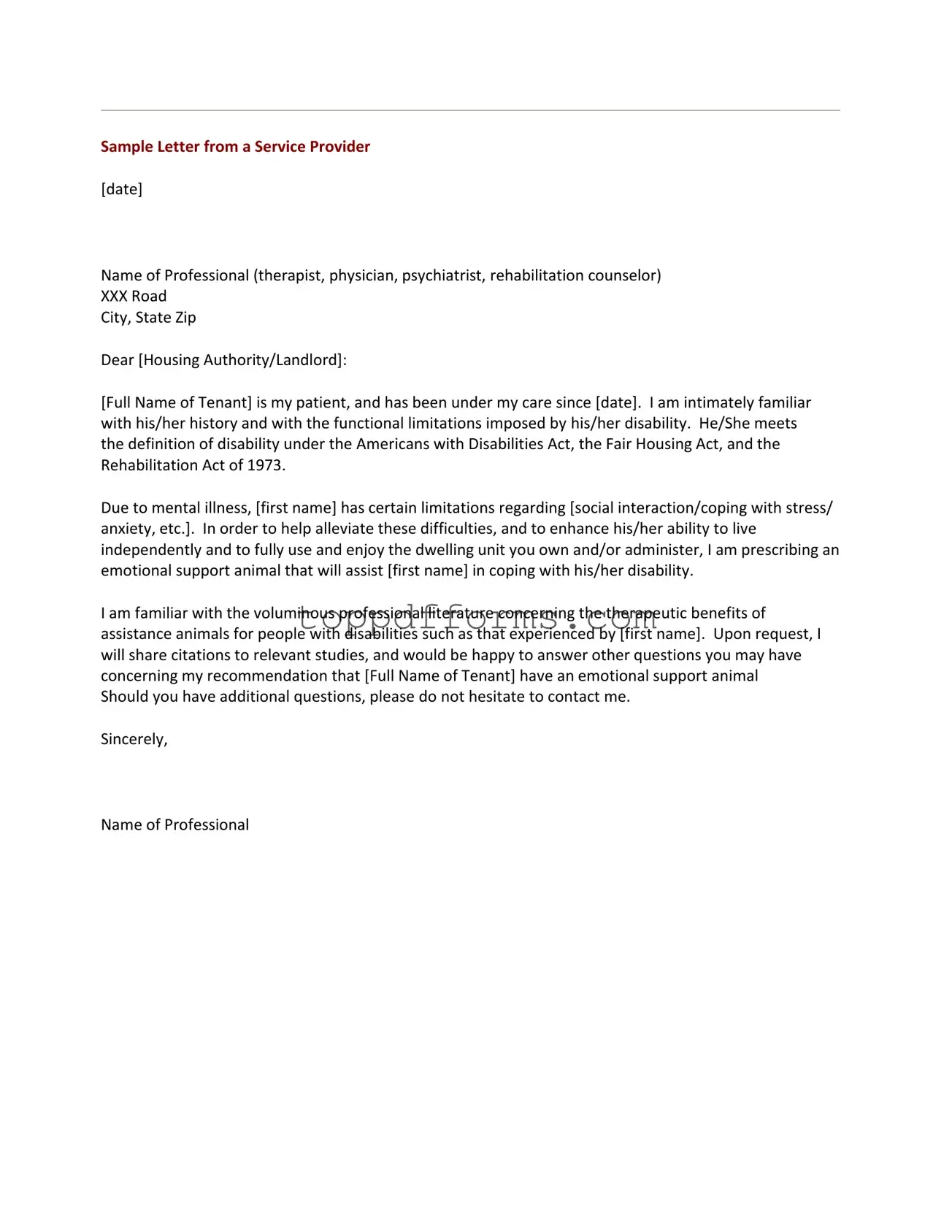Free Emotional Support Animal Letter Form
Things You Should Know About This Form
What is an Emotional Support Animal Letter?
An Emotional Support Animal (ESA) letter is a document written by a licensed mental health professional. This letter confirms that an individual has a mental or emotional disability and that an emotional support animal provides necessary support. The letter allows individuals to live with their ESA in housing that may otherwise prohibit pets and may provide certain travel accommodations under specific circumstances.
Who can provide an ESA letter?
A qualified mental health professional, such as a psychologist, psychiatrist, or licensed clinical social worker, can issue an ESA letter. It is important that the professional has a legitimate relationship with the individual and is familiar with their mental health history. This ensures that the letter is credible and meets legal requirements.
What should be included in an ESA letter?
The letter should include several key elements: the mental health professional's contact information, their license type and number, a statement confirming the individual's need for an emotional support animal, and a description of the individual's mental or emotional condition. Additionally, the letter should be printed on official letterhead to enhance its legitimacy.
Is an ESA letter required by law?
While an ESA letter is not a legal requirement in all situations, it is often necessary to access certain rights and accommodations. For example, housing providers may request this letter to allow an emotional support animal in a no-pets policy. Having a valid ESA letter can help individuals navigate these situations more effectively.
Can I get an ESA letter online?
Yes, many services offer online evaluations for obtaining an ESA letter. However, it is crucial to ensure that the service is legitimate and that a licensed mental health professional evaluates the individual's needs. Avoid services that promise instant letters without a proper assessment, as these may not hold up under scrutiny.
How long is an ESA letter valid?
The validity of an ESA letter can vary. Generally, it is advisable to obtain a new letter every year or whenever there is a significant change in the individual's mental health status. Some housing providers or airlines may have specific policies regarding the frequency of required documentation, so it is wise to check their guidelines.
File Information
| Fact Name | Description |
|---|---|
| Definition | An Emotional Support Animal (ESA) letter is a document from a licensed mental health professional stating that an individual requires an emotional support animal for their mental health. |
| Legal Standing | ESAs are protected under the Fair Housing Act (FHA) and the Air Carrier Access Act (ACAA), allowing them to live with their owners in housing that may otherwise prohibit pets. |
| Provider Requirements | The letter must be issued by a licensed mental health professional, such as a psychologist or psychiatrist, who has evaluated the individual. |
| State-Specific Laws | Some states have additional laws governing ESAs. For example, California requires the letter to be written by a licensed therapist in the state. |
| No Special Training | Unlike service animals, ESAs do not require specific training to perform tasks. Their primary role is to provide comfort and emotional support. |
| Housing Rights | Under the FHA, landlords must provide reasonable accommodations for ESAs, even if their policies ban pets. |
| Travel Regulations | Airlines may have different policies regarding ESAs. Always check with the airline before traveling, as some have changed their rules recently. |
| Validity Period | ESA letters typically do not have a set expiration date but may be required to be renewed annually to ensure ongoing need. |
| Documentation | Individuals should keep a copy of their ESA letter on hand, as landlords or airlines may request to see it. |
| Emotional Support vs. Service Animals | It's crucial to understand that ESAs are not the same as service animals, which are trained to perform specific tasks for individuals with disabilities. |
Common mistakes
When completing the Emotional Support Animal Letter form, individuals often make several common mistakes that can lead to complications. One frequent error is providing incomplete or inaccurate personal information. It is essential to ensure that all fields, such as name, address, and contact information, are filled out correctly. Inaccuracies can cause delays in processing and may even result in the rejection of the application.
Another mistake involves failing to include necessary documentation from a licensed mental health professional. The letter must be signed and dated by a qualified therapist or psychiatrist. Omitting this crucial step can invalidate the request for an emotional support animal. It is important to ensure that the professional's credentials are clearly stated in the letter.
Many applicants overlook the specific requirements of their housing provider or airline. Each entity may have different guidelines regarding emotional support animals. Not adhering to these requirements can lead to confusion and potential denial of access. Therefore, it is advisable to review the policies beforehand and tailor the letter accordingly.
Lastly, individuals sometimes neglect to clearly explain the need for the emotional support animal. The letter should articulate how the animal assists with mental health issues. A vague or generic explanation may not suffice and could lead to misunderstandings. Providing detailed information about the relationship between the individual and the animal is crucial for a successful application.
Popular PDF Forms
Printable Physical Exam Template - List any activity limitations or restrictions to ensure safe participation in daily living and work.
Creating a thorough Last Will and Testament can be vital for ensuring your estate is managed according to your wishes. For guidance on this crucial legal document, visit our comprehensive resource on the Last Will and Testament process here.
I 864 Step by Step Instructions - If the sponsor's income changes, they must inform USCIS.
